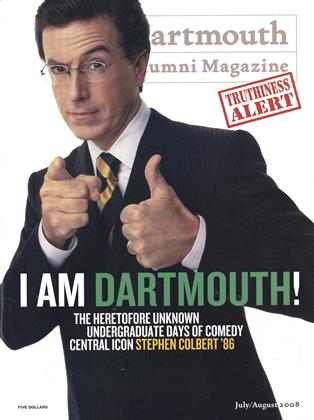MORE THAN 400 PEOPLE turned out in April to hear philosophy professor Walter Sinnott-Armstrong and conservative icon Dinesh D'Souza '83 debate the existence of God. Posing the question "Does Morality Require a Religious Foundation?" the event pitted the popular Hardy Professor of Legal Studies—an atheist—against the author of the recently released What's So Great About Christianity.
Sinnott-Armstrong started the evening by rejecting the claim that we cannot be good without God. "What makes an action immoral is the harm it causes," Sinnott-Armstrong said, emphasizing his argument with Powerpoint slides. "This account does not depend on God or religion." Highlighting Bible verses he had distributed among the audience as the event began—including verses endorsing slavery, the killing of non-believers and the subservience of women-Sinnott-Armstrong explained that we must use our already present moral judgment to decide which tenets to accept and which to reject.
D'Souza drew upon historical details to assert that these morals arose in Christian societies. "Christianity is responsible for values even secular people hold dear," he said, pointing to justice, democracy and the importance of all human life.
The tone of the 90-minute discussion, although punctuated with attempts at humor—mainly by D'Souza, who at one point commented, "I feel as if I'm at a rodeo: a point here and a point there, but a lot of hull in between"-was heated. The doors to Alumni Hall were propped open with fans to accommodate not only the unseasonably warm night but also the buzzing crowd.
Post debate, neither participant claimed victory but both agreed on one thing. "The goal was education," says Sinnott-Armstrong. And D'Souza? "This was a high-level debate, and I think ultimately it was the students who came out the winners."
 View Full Issue
View Full Issue
More From This Issue
-
 Cover Story
Cover StoryThe Unknown and Unsung Undergraduate Days of Stephen Colbert ’86
July | August 2008 By Robert Sullivan ’75 -
 Feature
FeatureOn Patrol
July | August 2008 By ED GRAY ’67 -
 Feature
FeatureThe Artful Lodger
July | August 2008 By Carolyn Kylstra ’08 -
 Feature
FeatureNotebook
July | August 2008 -
 Feature
FeatureAlumni News
July | August 2008 By John Kemp Lee '78 -
 Article
ArticleNewsmakers
July | August 2008 By BONNIE BARBER
Lauren Smith '08
-
 Article
ArticleClass of 1969
Mar/Apr 2008 By Lauren Smith '08 -
 Article
ArticleTurning a New Leaf
May/June 2008 By Lauren Smith '08 -
 Article
ArticleA Field of Dreams
May/June 2008 By Lauren Smith '08 -
 Article
ArticleIF YOU WANT TO PLAY, YOU'VE GOT TO PAY
May/June 2008 By Lauren Smith '08 -
 Article
ArticleClass of 2002
July/August 2008 By Lauren Smith '08 -
 Article
ArticleGive a Rouse
Sept/Oct 2008 By Lauren Smith '08







